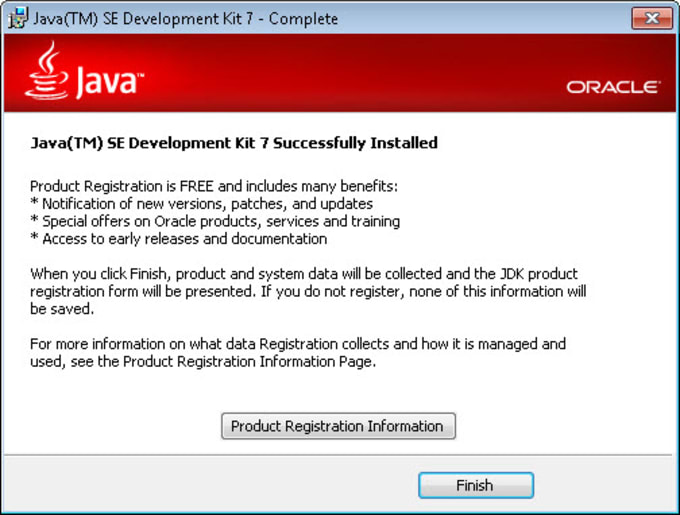
- #ORACLE JDK 8 DOWNLOAD WITHOUT LOGIN DRIVER#
- #ORACLE JDK 8 DOWNLOAD WITHOUT LOGIN UPGRADE#
- #ORACLE JDK 8 DOWNLOAD WITHOUT LOGIN LICENSE#
- #ORACLE JDK 8 DOWNLOAD WITHOUT LOGIN FREE#
The kernel itself receives patches from all sorts of contributors. Think of Java now like you think of the Linux kernel. These companies (along with other contributors) also make their patches available to Oracle. They take the patches offered by Oracle and maintain their own distributed binaries based on them. Other companies/organizations will maintain their own LTS release versions and will apply the source patches to keep their versions up to date.ĪdoptJDK, Redhat/IBM, Ubuntu, and Amazon all maintain their own LTS versions (Java 8 & 11). Oracle will release source-code patches for Java 8 & Java 11 as they make them for the LTS releases. Oracle will also develop and maintain proprietary long term support versions for their paid subscriber base. Oracle will lead the development of the short-term supported OpenJDK versions and will make the compiled distributions available for free. It's complicated, but to try and summarize: The long-term support versions (Java 8 & Java 11) are only offered by Oracle through a paid subscription. Yes, but they only offer the short-term support versions there. Everything is funded with support, and the prices have been cut drastically to be competitive with other companies that offer OpenJDK support. Everything is open source, no field-of-use restrictions and no search toolbar. All of that is gone when we changed our funding model. In the past, when much of the JDK was closed, Sun and then Oracle funded the JDK by licensing Java for mobile/embedded devices (as there were field-of-use restrictions) as well as that annoying search toolbar, and the sale of quite expensive support. Companies that for some reason cannot follow the cheap, easy path and prefer large but planned upgrades, can stick to the paid LTS service, and that is how Oracle funds OpenJDK.
#ORACLE JDK 8 DOWNLOAD WITHOUT LOGIN UPGRADE#
We believe that it is the easiest, cheapest upgrade path Java has ever had. Java 9 was the last major release ever, and if you follow this recommended, default path you'll never have another major upgrade again.
#ORACLE JDK 8 DOWNLOAD WITHOUT LOGIN FREE#
In any event, the recommended path is to use the current JDK, for which you get perpetual free support (by which I mean patches and updates) from Oracle, or from other sources. That it came at the same time as a change in how we name our releases has only added to the confusion.
#ORACLE JDK 8 DOWNLOAD WITHOUT LOGIN LICENSE#
The licensing change, from a semi-free/open, semi-proprietary/paid JDK to a 100% open source license combined with optional paid support has, indeed, confused some people. I agree that the messaging could be better (we're working on that). Oracle's JDK is, for the first time since Java's inception, 100% open source. Third, I don't know about add-ons, but the transition we've recently done was open source all of the previously proprietary features in Oracle's JDK. Nearly 100% of new large features are led by Oracle.

#ORACLE JDK 8 DOWNLOAD WITHOUT LOGIN DRIVER#
Second, while we happily cooperate with other contributors like Red Hat and Google, and greatly appreciate their contributions, Oracle is not only very much in the driver seat, but ~90% of the work on OpenJDK is done at Oracle.

It is not the only product, but it is the only project. I work on OpenJDK at Oracle, and there are several inaccuracies in your account.įirst, not only has OpenJDK not been "spun off", OpenJDK is the name of one and only JDK project at Oracle. Oracle is now a member of the Java community, not necessarily the driver. But if you haven't been aware of the OpenJDK and following along with it - if your sole source of all things Java has been Oracle - then it's definitely time for a wake up call. The messaging could have possibly been better. It's a little shaky right now with all the hubbub about Oracle's licensing of the Oracle JVM. Instead, the above plan allowed for Oracle to keep the core of Java in one piece, conceding that other companies would help with its evolution, and still reserve their ability to make a buck later.

Without doing the above, there was real risk that Java would succumb to other more open platforms or be splintered off by companies like IBM, Redhat, etc. They have helped get the OpenJDK community off the ground and are still invested in its success. Oracle, beyond what you might think of them, has done a pretty decent job of following the overall plan. Once OpenJDK is maintained by the open source community and generally healthy, Oracle starts working on proprietary value-add additions that can benefit their customer base (and bank accounts). Oracle provides support, patches, community and endeavors to help get OpenJDK self-sustaining.ģ. Oracle starts to relicense as open source most parts of the JVM, spinning off OpenJDK in the process.Ģ. This should not be a surprise or cause any outrage. This was part of the master plan and roadmap for Java for a long time now.


 0 kommentar(er)
0 kommentar(er)
